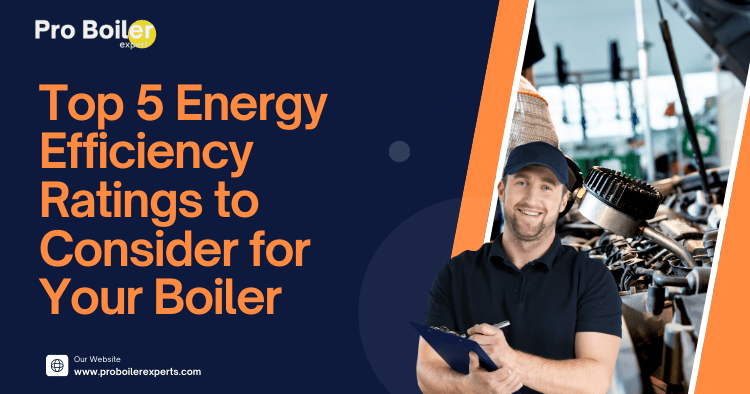Table of Contents
- Introduction
- 1. Annual Fuel Utilization Efficiency (AFUE)
- 2. Energy Star Certification
- 3. Seasonal Efficiency Ratio (SEER)
- 4. Heating Seasonal Performance Factor (HSPF)
- 5. Boiler Efficiency Index (BEI)
- Conclusion
- FAQs
Introduction
When it comes to choosing a boiler, energy efficiency is a crucial factor that not only impacts your utility bills but also contributes to a greener planet. Understanding energy efficiency ratings can help you make an informed decision, ensuring you select a boiler that meets your needs while minimizing energy consumption. In this article, we will explore the top five energy efficiency ratings to consider for your boiler, providing insights to help you make the right choice.
1. Annual Fuel Utilization Efficiency (AFUE)
One of the most recognized metrics for assessing boiler efficiency is the Annual Fuel Utilization Efficiency (AFUE) rating. This figure is expressed as a percentage and indicates how much of the fuel consumed by the boiler is converted into usable heat.
How AFUE Works:
- An AFUE rating of 90% means that 90% of the fuel is utilized for heating, while the remaining 10% is lost through exhaust and other inefficiencies.
- The higher the percentage, the more efficient the boiler is, which can lead to substantial energy cost savings.
Why It Matters:
- AFUE ratings are especially important for homeowners seeking to lower their energy bills. High-efficiency boilers typically have AFUE ratings of 90% or higher.
For more detailed information on AFUE, you can visit the U.S. Department of Energy’s Energy Efficiency and Renewable Energy. Also, consider reading about the top 5 gas boilers for efficient home heating in 2024 to see models that excel in this rating.
2. Energy Star Certification
Energy Star is a widely recognized mark that indicates a product meets strict energy efficiency guidelines set by the U.S. Environmental Protection Agency (EPA). When shopping for a boiler, look for the Energy Star label.
Key Benefits:
- Products with Energy Star certification typically have an AFUE rating of 90% or higher.
- Choosing an Energy Star boiler can lead to significant savings on energy bills, as these models are designed to consume less energy than standard models.
The Bigger Picture:
- By opting for an Energy Star-certified boiler, you are not only investing in your home but also contributing to a reduction in greenhouse gas emissions.
For more information, check out the Energy Star website. You may also find useful insights in our piece on the top 5 benefits of condensing boilers you should know, which often feature Energy Star models.
3. Seasonal Efficiency Ratio (SEER)
The Seasonal Efficiency Ratio (SEER) is primarily used to measure the cooling efficiency of air conditioners but is also relevant for certain types of boilers that provide both heating and cooling.
Understanding SEER:
- SEER is calculated by dividing the total cooling output during a typical cooling season by the total electric energy input during the same period.
- A higher SEER rating indicates a more efficient cooling system.
Why It’s Important:
- If your boiler also acts as a heat pump for cooling, a high SEER rating will contribute to overall energy savings, especially in regions with a significant cooling season.
To learn more about SEER ratings, visit the U.S. Department of Energy. For a deeper understanding of heating options, see our article on combination vs. system boilers: pros, cons & key differences.
4. Heating Seasonal Performance Factor (HSPF)
Similar to SEER, the Heating Seasonal Performance Factor (HSPF) is a metric used to measure the efficiency of air-source heat pumps, which can also function as a boiler in some systems.
Breaking Down HSPF:
- The HSPF rating is determined by dividing the total heating output during the heating season by the total energy consumed in watt-hours.
- An HSPF of 8 or higher is considered efficient.
Importance of HSPF:
- For homeowners utilizing heat pumps for both heating and cooling, a higher HSPF can lead to lower energy bills and a more comfortable living environment during winter months.
For further details, refer to the Energy Efficiency website. Our piece on electric boilers: key pros and cons you should know may also be informative if you are considering electric heating.
5. Boiler Efficiency Index (BEI)
The Boiler Efficiency Index (BEI) is a comprehensive metric that incorporates various factors to evaluate the overall efficiency of a boiler.
How BEI Works:
- BEI considers fuel consumption, operational efficiency, and emissions, providing a holistic view of a boiler’s performance.
- Unlike AFUE, which focuses solely on fuel utilization, BEI offers insights into the environmental impact of the boiler.
Benefits of BEI:
- A boiler with a high BEI not only provides better energy savings but also ensures lower environmental impact, making it an attractive option for eco-conscious consumers.
For more information on BEI ratings, you can explore resources available through The International Energy Agency. Additionally, our article on biomass boilers for eco-friendly heating provides insights into sustainable options that may have favorable BEI ratings.
Conclusion
Choosing a boiler with the right energy efficiency ratings can make a significant difference in your energy costs and environmental impact. By understanding metrics like AFUE, Energy Star certification, SEER, HSPF, and BEI, you can select a boiler that meets your needs while promoting energy conservation.
Investing in a high-efficiency boiler is not just about saving money; it’s also about supporting a sustainable future for our planet.
FAQs
What is the most important energy efficiency rating for a boiler?
The Annual Fuel Utilization Efficiency (AFUE) rating is typically considered the most important, as it directly measures how efficiently a boiler converts fuel into heat.
How can I improve my boiler’s efficiency?
Regular maintenance, proper insulation of pipes, and ensuring your boiler is appropriately sized for your home can all help improve efficiency.
Are Energy Star boilers worth the investment?
Yes! Energy Star boilers may have a higher upfront cost but can lead to significant savings on energy bills over time and reduce your carbon footprint.
What should I look for when buying a new boiler?
Consider the AFUE rating, Energy Star certification, the type of fuel used, and any additional features that may contribute to efficiency and comfort.
For more insights, feel free to explore the links provided throughout the article, and don’t hesitate to reach out with any further questions!





